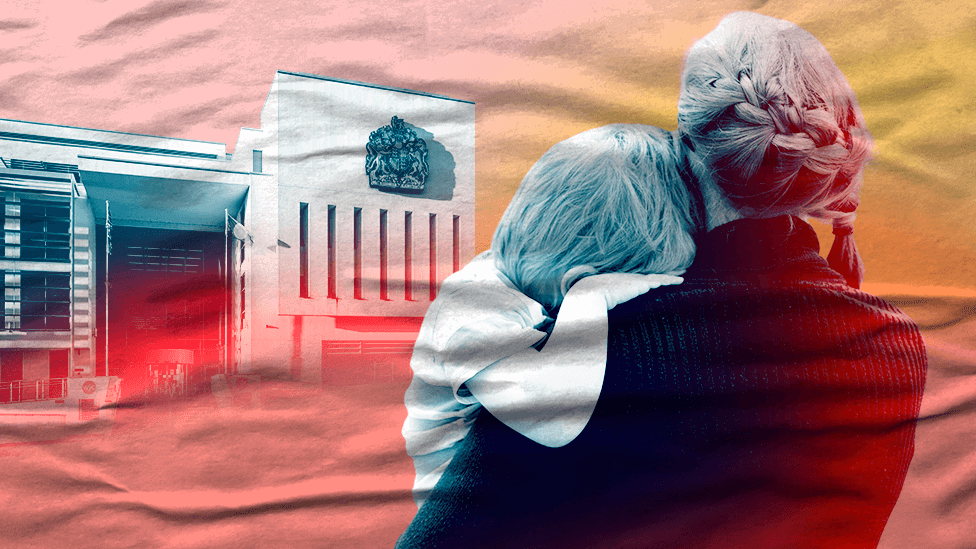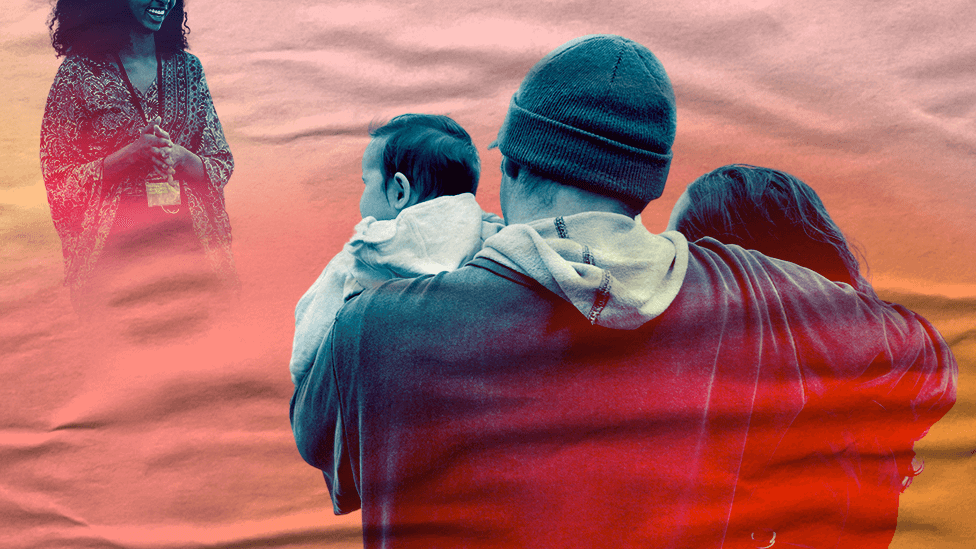A mum's 'remarkable turnaround' to win her baby back
- Published

Journalists reported on family court proceedings
In a draughty corridor of Leeds Family Court, a father cuddles his young son. The baby is chewing the string of his dad's hoodie, smiling broadly.
That grin is magnetic. Lawyers dressed in severe black outfits hurry over to say hello, and Freddie coos and giggles in response.
Much of these courts' daily business is to separate children from their parents. It's exceptional to see a child here, let alone one happily reunited with his parents.
We spent three weeks in the court and were able to report proceedings which are usually heard in private, as part of a pilot.
All the names of the children and parents in this report have been changed
Across the 15 different cases we saw, there were gruelling histories of abuse, of appalling neglect, sometimes children living in homes without food, or heating. Their parents often misuse drugs and alcohol, and suffer mental illness.
Those parents will usually be in court, listening to those descriptions - and often they will be understandably upset and angry. In these cases, which mostly hear applications by local authorities to take children into care, the atmosphere can be extremely tense. Children can be removed as soon as the hearing is over.
If a child is taken into care, they will enter an overloaded system where there are record numbers of children - 82,000 in England. There's an acute shortage of places for the most vulnerable or troubled teenagers.
Freddie's mother Jessie has been here many times before. She has given birth to five children, but baby Freddie is the first one she may be able to keep.
That depends on the decision of Nancy Hillier, the senior judge in this court.
In the past Jessie had misused drugs and alcohol. Sexually abused as a young girl, she suffered mental health problems. Court papers described her lifestyle as "chaotic". She had her first baby when she was a teenager, and he was taken into care.
Jessie soon became pregnant again, and that child was also removed. That happened again, and again. She would place her child "at physical and emotional risk", said an expert report.
Jessie was advised to have specialist therapy, but none was available on the NHS. She told us she tried to borrow money to fund it privately, without success. She even considered going to a loan shark.
"It was a vicious, vicious circle," she said. "I don't really understand why they say, 'Right you need to do X Y Z,' and that's not available."
Researchers tell us that it is commonplace for mothers in these cases to be recommended specialist therapy, which can't be accessed before the court proceedings end.
That was borne out by another case in Leeds, where Sarah was trying to stop her toddler Ellie from being adopted.
This would separate her from her birth family and break the very close link she has with her older half-siblings, children from Sarah's earlier relationship who currently live with their father.
"They play together, they cuddle each other. They love each other," one barrister said, noting that sibling relationships are the most important in life.
In her late 20s, neatly dressed, hair in a tidy ponytail, Sarah sat poised throughout. She listened intently. She wanted Ellie to come home, or to stay in foster care while she had therapy. Several times, when a barrister shared a photograph of the siblings together, or mentioned Ellie's father, Sarah covered her face or broke into loud sobs.

Sarah cried during the court proceedings
She had been recommended therapy by the expert psychologist who had assessed her for the court. Her case had lasted 18 months, and she was still on the NHS waiting list. The local authority had not offered to fund the treatment.
It was "cruel" that she couldn't get the therapy, said barrister Christopher Styles as he cross-examined the mother's social worker. "I don't entirely disagree with you," she responded.
Sarah had overcome alcohol and drug abuse. She claimed to have separated from her abusive ex, but social workers doubted that. He was the man most likely responsible for injuries to one of the children, that led to these court proceedings.
The judge granted the adoption placement order, and said Sarah should have therapy as she will continue to see her other children.
Jessie's situation was different. She had managed to overcome her past problems on her own. She told us the isolation of Covid lockdown had given her time to reflect. When she began seeing Freddie's father, she investigated his past, and he "came back squeaky clean" - unlike some of her other partners. She said, "I thought, this is my shot at being happy."
Jessie trained for a new job, which she loves, and which obliges her to stay sober, out of trouble, and well. "I can't afford to have a mental breakdown," she said.
When a child is first taken into care - as Freddie was removed at birth - it is via an interim care order issued by the court. The court will then order assessments of the parents to see whether the child can be returned safely to them or to another family member, whether they will stay in the care of the state, or be adopted.
Family barrister Lucy Reed said the courts do try to keep children within their natural families, as the law requires. Sometimes that can result in decisions that look strange to those who don't know the system.
We also heard the case of baby Jamie, who was born withdrawing from opiates, because his mother was a heroin addict. He struggled to breathe and feed, according to court papers. Nurses described him as "jittery", "sneezing" and "really stiff".
One nurse said it was the worst case of withdrawal she had seen.
Jamie was placed to live with a relative.
His father Joe wanted the baby to live with him. Joe had abused cannabis and heroin but had recently given up. The court heard that after a lot of work he had persuaded the West Yorkshire local authority that the baby would be safe with him.
Beverley Barnett Jones worked on the frontline of child protection for nearly 30 years. She's now at the Nuffield Family Justice Observatory. She said such decisions are not that exceptional.
She said most people would question why you would do that. But she says people can change. "They surprise you. And they show, actually, that change is real, it's authentic."
Joe worked closely with the social workers and had a lot of support from his family. He told us that the baby was doing well, and that he enjoyed being a first-time father. "It makes life worth living," he said. "It's amazing."
Since the court had granted a care order for Jamie, his dad will get extra support from social workers. But it also means parental responsibility is shared between Joe and the local authority. If anything goes wrong, the council can take the baby back into care.
In Freddie's case too the reports on the family were positive. The Cafcass Guardian, who represents the child's interest, supported his return home.
The same psychologist who had advised that Jessie couldn't safely care for her fourth child, wrote this time around that she had "much improved psychological and emotional stability" and there were "no significant issues at present".

Freddie was reunited with his parents
Freddie had been placed with his parents a few weeks before the hearing, and that had gone well. Jessie told us it was as though he was her first child.
"The first night we had him at home, it was really, really strange to wake up to a crying baby," she said.
But then when she peeked over the cot and saw his "little smiley face", she thought "the fight was worth it" and was glad she hadn't given up."
In court, Judge Hillier praised Jessie's "remarkable turnaround" saying "these parents have done incredibly well with Freddie" and that he is described as "thriving in their care".
She also challenged the local authority, saying they needed to rewrite a document explaining why they had acted in this case. It refers to Jessie's psychological problems as being current when they are now in the past.
Jessie told me outside court that she felt vindicated, especially when the judge told the council's lawyer to rework the document. "It was like having someone turning around to the local authority and saying to them on my behalf: 'I told you so.'"
A West Yorkshire local authority will support the family under what is known as a supervision order. It means the local authority has to "advise, assist and befriend" the child.
Many mothers can't get out of the "vicious circle" as Jessie described it. Once one baby is taken into care, they quickly get pregnant again, and it is extremely likely that the second child will be taken away, too. Professor Karen Broadhurst has been researching babies "born into care" for nearly a decade.
"We know statistics remain stubbornly high," she said. "We estimate that one in every four women at least will return to court. And for the very youngest women this will be one in three, which is an incredibly high proportion".
We were able to follow these cases, to talk to Jessie and Joe, thanks to an experiment in "open justice", currently running in three court centres - Leeds, Cardiff and Carlisle. For decades there have been calls for greater openness in family courts, which this pilot hopes to address. Currently, most hearings are held in private.
Lucy Reed is the founder of the Transparency Project, a supporter of the trial.
"I think it has potential to be really important," she told us, acknowledging there would be "teething problems". The courts are trying to address them.
In court, we saw lawyers and barristers advocating on behalf of local councils, the children and their parents. The process is adversarial, something that can feel confrontational, especially when people are being cross-examined. Some of the cases have been convened urgently as emergency hearings - one mother spoke to a judge from the hospital maternity ward.
Several of the cases had lasted for many months, extending beyond the court's 26-week time frame for concluding a case.
Jessie said she was pleased we'd seen her case. "It's about time," she said. "Family courts need to stop being so private. People need to see what's going on."